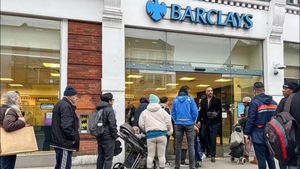Tens of thousands of protesters took to the streets across Germany this weekend, voicing their opposition to center-right leader Friedrich Merz and his migration bill, which has sparked intense backlash for allegedly courting the support of the far-right Alternative for Germany (AfD) party.
The protests began after Merz, the head of the Christian Democratic Union (CDU), pushed for stricter immigration policies, reflecting growing concerns over immigration and national security issues. Organizers estimated around 200,000 demonstrators gathered on Sunday afternoon, with major protests having already taken place on Friday, which included substantial crowds across cities like Berlin, Hamburg, and Munich.
According to public broadcaster ARD, more than 220,000 people marched prior to Sunday, protesting against Merz's proposed policies. These protests highlight the deep divisions within German society surrounding immigration and the apparent normalization of far-right support at the national level.
Historically, since the conclusion of World War II, mainstream German parties have adhered to an unwritten agreement to avoid coalition-building with far-right factions. Nonetheless, Merz's attempt to gain traction with the electorate has raised alarm, particularly as his proposal seeks parliamentary support from the AfD, marking what some view as the beginning of the erosion of these democratic norms.
Merz's motivations for the bill intensified following the tragic knife attack last month, allegedly attributed to a rejected asylum seeker. Following this, he publicly declared his commitment to addressing irregular migration and tightening borders. "He wants to cut through the norm of not working with right-wing extremists in one fell swoop," criticized the left-wing NGO Campact, one of the organizers of the protests.
Demonstrators expressed their anxiety over Merz's alignment with the far-right, carrying banners emblazoned with messages such as, "No Racism" and "For Democracy and Diversity." The backlash singled out Merz's efforts to secure votes from the AfD, with many protesters arguing it endangers the foundational democratic values of Germany.
A particularly notable protest occurred on the Rhine River, where hundreds took to the water, gathering on approximately 350 boats to voice their dissent, front and center of Cologne's famed cathedral. Similar scenes unfolded across various major urban centers, with estimates of 160,000 participants attending the Berlin rally alone, highlighting the widespread discontent against what protesters call the CDU's capitulation to far-right ideologies.
The political tensions were compounded when the German parliament, or Bundestag, rejected the conservative-backed migration bill just as protests were gaining momentum. Details revealed the proposal aimed to tighten Germany's immigration laws by amending residence laws and banning family reunification for certain asylum seekers, which critics say could have far-reaching impacts on immigrant families.
The failure of the bill represented not only a setback for Merz and the CDU but also underscored the growing opposition among left-leaning parties like the Greens and Social Democrats, who labeled the CDU's reliance on the AfD's votes as violating established democratic principles. This situation raises questions about the far-right’s increasing influence and the parties' upcoming strategies heading toward the February 25 federal elections.
Polling data indicates the CDU leading with approximately 30% support, with the AfD trailing at around 20%. Although Merz maintains he does not and will not collaborate with the AfD, many see his actions as encouraging the party's rise, pushing the boundaries of acceptable political rhetoric.
Chancellor Olaf Scholz has voiced urgent concerns over the potential coalition between the conservatives and the far-right, reminiscent of dangerous developments seen elsewhere. He warned, "The conservatives and the far-right could soon join forces to govern the country," stirring unease about the future of German democracy.
The protests this weekend demonstrate the citizens' frustration with the growing influence of the AfD and the conservatism embraced by mainstream parties like the CDU. Activists, labor unions, churches, and civil rights organizations leveraged this moment to stand against what they perceive as dangerous moves undermining Germany's democratic foundations.
Faced with staunch opposition, the CDU must navigate the charged political climate as they aim to recapture public confidence against the backdrop of rising immigration concerns. Time will tell whether these protests will catalyze significant political change or if the current momentum toward the far-right will continue to shape Germany's political future.



